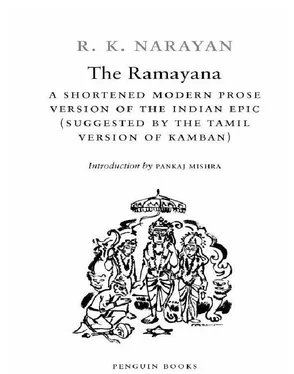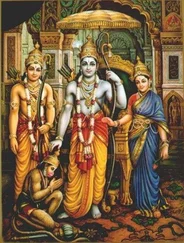Махариши Вальмики - The Ramayana
Здесь есть возможность читать онлайн «Махариши Вальмики - The Ramayana» весь текст электронной книги совершенно бесплатно (целиком полную версию без сокращений). В некоторых случаях можно слушать аудио, скачать через торрент в формате fb2 и присутствует краткое содержание. Жанр: Старинная литература, на английском языке. Описание произведения, (предисловие) а так же отзывы посетителей доступны на портале библиотеки ЛибКат.
- Название:The Ramayana
- Автор:
- Жанр:
- Год:неизвестен
- ISBN:нет данных
- Рейтинг книги:3 / 5. Голосов: 1
-
Избранное:Добавить в избранное
- Отзывы:
-
Ваша оценка:
- 60
- 1
- 2
- 3
- 4
- 5
The Ramayana: краткое содержание, описание и аннотация
Предлагаем к чтению аннотацию, описание, краткое содержание или предисловие (зависит от того, что написал сам автор книги «The Ramayana»). Если вы не нашли необходимую информацию о книге — напишите в комментариях, мы постараемся отыскать её.
The Ramayana — читать онлайн бесплатно полную книгу (весь текст) целиком
Ниже представлен текст книги, разбитый по страницам. Система сохранения места последней прочитанной страницы, позволяет с удобством читать онлайн бесплатно книгу «The Ramayana», без необходимости каждый раз заново искать на чём Вы остановились. Поставьте закладку, и сможете в любой момент перейти на страницу, на которой закончили чтение.
Интервал:
Закладка:
When Sakara’s horse started out Indra abducted it and kept it out of view in the deepest world underground, behind Sage Kapila, who had earlier sought this seclusion far away from the earth for his spiritual practices. When it became known that the horse was lost underground, Sakara’s sons started digging wide and deep and went down into the bowels of the earth. They found their horse tethered behind the man in meditation; they seized the horse and tormented the saint, assuming that he had stolen it; whereupon the saint with an angry glare reduced them to ashes. One of the party survived this expedition, a grandson of the emperor; he apologized to the sage and came home and helped the old king to complete his “Horse Sacrifice.” Later, King Sakara renounced the world in favour of his grandson, whose son was Bhagiratha, responsible for bringing the Ganges down to earth.
When Bhagiratha grew up and learnt of the fate of his ancestors, he made it his mission in life to help them attain salvation, instead of leaving their spirits dangling in mid-air without proper disposal of their remains. He prayed intensely for ten thousand years to Brahma, the creator, who advised him to seek the help of Shiva to bring down Ganga from high heaven and to wash their bones in the holy water. He prayed to Shiva for ten thousand years and he appeared and promised to grant his wishes if he could somehow persuade Ganga to descend. And then he prayed to Ganga for five thousand years. Ganga appeared to him in the guise of an elegant little girl and said, “Shiva has promised you his help, no doubt, but if Ganga descends in her full force, the earth will not bear it; nothing can ever bear the force of her descent. Shiva agreed to help you—but find out what his intentions are. Pray to him again.”
After further meditations, by Bhagiratha, Shiva again appeared and said to him, “Let Ganga come down, I will help you. I will see that no drop of that water is wasted or allowed to trouble anyone.” This was developing into a series of challenges between Shiva and Ganga, and Bhagiratha began to feel that he was being tossed between challenging gods. But undaunted (his name is a byword for indefatigable effort), he had prayed for thirty thousand years in all, undergoing severe austerities—such as living on dry fallen leaves, then on air, then on sun’s rays, and in the last stages he gave up even these and survived on practically nothing, conscious of nothing but his own purpose and faith in his cause.
At the end of Bhagiratha’s penance, Ganga, whose origin was in the far-off world of Brahma, the creator, started her descent in a roaring deluge. As promised, Shiva appeared on the scene just when the deluge was about to hit and pulverize the earth. Shiva took his stance, planted his feet firmly, arms akimbo, and received the impact of the descent on his head, and the threatened deluge just vanished into his tangled, matted locks. For all the uproar and conceit that Ganga had displayed this was a tame end—so tame and quiet indeed that Bhagiratha began to feel uneasy. It seemed as if this was the end of Ganga and that all his prayers and penances had produced nothing in the end. Shiva understood his fears and let a trickle out of his hair which Bhagiratha led on carefully and anxiously underground over his ancestors’ ashes and helped their souls attain salvation. Thus Bhagiratha helped not only his ancestors, but all mankind, as the Ganges bears a countless number of holy shrines on its banks, and nourishes millions of acres of land and people along its course. The pit dug by Sakara’s sons while searching for their horse also filled up and became the oceans of today.
They arrived within sight of Mithila City. While passing over slightly raised ground beside the walls of the fort, Rama noticed a shapeless slab of stone, half buried vertically in the ground; when he brushed past, the dust of his feet fell on it, and transformed it, that very instant, into a beautiful woman. As the woman did obeisance and stood aside respectfully, Viswamithra introduced her to Rama. “If you have heard of Sage Gautama, whose curse resulted in great Indra’s body being studded with a thousand eyes, all over . . . This lady was his wife, and her name is Ahalya.” And he told Rama her story.
AHALYA’S STORY
Brahma once created, out of the ingredients of absolute beauty, a woman, and she was called Ahalya (which in the Sanskrit language means non-imperfection). God Indra, being the highest god among the gods, was attracted by her beauty and was convinced that he alone was worthy of claiming her hand. Brahma, noticing the conceit and presumptuousness of Indra, ignored him, sought out Sage Gautama, and left him in charge of the girl. She grew up in his custody, and when the time came the sage took her back to Brahma and handed her over to him.
Brahma appreciated Gautama’s purity of mind and heart (never once had any carnal thought crossed his mind), and said, “Marry her, she is fit to be your wife, or rather you alone deserve to be her husband.” Accordingly, she was married, blessed by Brahma and other gods. Having spent her childhood with Gautama, Ahalya knew his needs and so proved a perfect wife, and they lived happily.
Indra, however, never got over his infatuation for Ahalya, and often came in different guises near to Gautama’s ashram, waiting for every chance to gaze and feast on Ahalya’s form and figure; he also watched the habits of the sage and noticed that the sage left his ashram at the dawn of each day and was away for a couple of hours at the river for his bath and prayers. Unable to bear the pangs of love any more, Indra decided to attain the woman of his heart by subterfuge. One day, hardly able to wait for the sage to leave at his usual hour, Indra assumed the voice of a rooster, and woke up the sage, who, thinking that the morning had come, left for the river. Now Indra assumed the sage’s form, entered the hut, and made love to Ahalya. She surrendered herself, but at some stage realized that the man enjoying her was an imposter; but she could do nothing about it. Gautama came back at this moment, having intuitively felt that something was wrong, and surprised the couple in bed. Ahalya stood aside filled with shame and remorse; Indra assumed the form of a cat (the most facile animal form for sneaking in or out) and tried to slip away. The sage looked from the cat to the woman and was not to be deceived. He arrested the cat where he was with these words:
“Cat, I know you; your obsession with the female is your undoing. May your body be covered with a thousand female marks, so that in all the worlds, people may understand what really goes on in your mind all the time.” Hardly had these words left his lips when every inch of Indra’s body displayed the female organ. There could be no greater shame for the proud and self-preening Indra.
After Indra slunk away, back to his world, Gautama looked at his wife and said, “You have sinned with your body. May that body harden into a shapeless piece of granite, just where you are. . . .” Now in desperation Ahalya implored, “A grave mistake has been committed. It is in the nature of noble souls to forgive the errors of lesser beings. Please . . . I am already feeling a weight creeping up my feet. Do something . . . please help me. . . .”
Now the sage felt sorry for her and said, “Your redemption will come when the son of Dasaratha, Rama, passes this way at some future date. . . .”
“When? Where?” she essayed to question, desperately, but before the words could leave her lips she had become a piece of stone.
Indra’s predicament became a joke in all the worlds at first, but later proved noticeably tragic. He stayed in darkness and seclusion and could never appear before men or women. This caused much concern to all the gods, as his multifarious duties in various worlds remained suspended, and they went in a body to Brahma and requested him to intercede with Gautama. By this time, the sage’s resentment had vanished. And he said in response to Brahma’s appeal, “May the thousand additions to Indra’s features become eyes.” Indra thereafter came to be known as the “thousand-eyed god.”
Читать дальшеИнтервал:
Закладка:
Похожие книги на «The Ramayana»
Представляем Вашему вниманию похожие книги на «The Ramayana» списком для выбора. Мы отобрали схожую по названию и смыслу литературу в надежде предоставить читателям больше вариантов отыскать новые, интересные, ещё непрочитанные произведения.
Обсуждение, отзывы о книге «The Ramayana» и просто собственные мнения читателей. Оставьте ваши комментарии, напишите, что Вы думаете о произведении, его смысле или главных героях. Укажите что конкретно понравилось, а что нет, и почему Вы так считаете.












